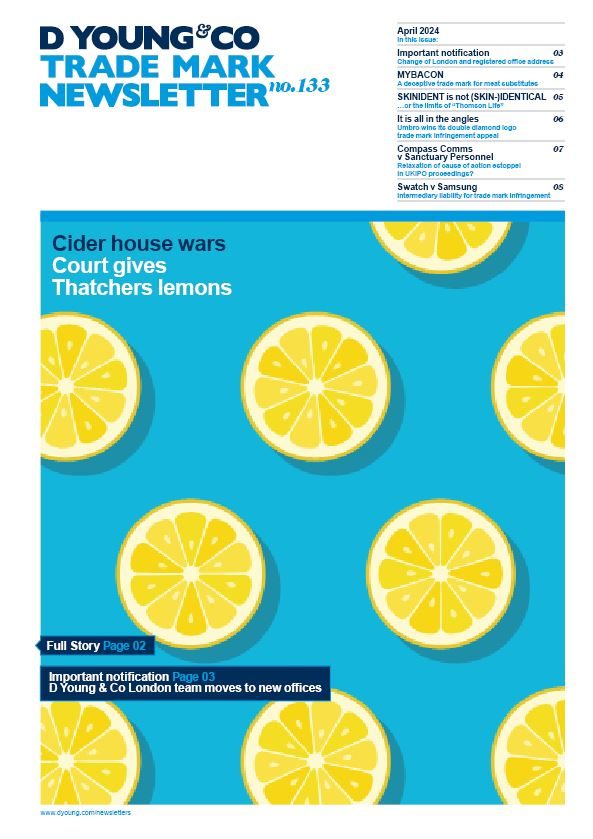Advocate General's opinion on refusal of the trade mark “Fack Ju Göhte”
In an academically interesting and humorous opinion, Advocate General Bobek proposed that the CJEU set aside the judgment of the General Court (GC) and annul the EUIPO’s decision to refuse registration of the word sign “Fack Ju Göhte”. The sign had been refused on the grounds that the mark was deemed contrary to the accepted principles of morality under Article 7(1)(f) EUTMR.
“Fack Ju Göhte” is the name of a successful Germany comedy produced by the appellant, Constantin Film Produktion GmbH, who had applied for the mark in connection with a wide range of (merchandising) goods and services. Johann Wolfgang von Goethe was an author whose works included “Die Leiden des jungen Werthers” (The Sorrows of Young Werther) first published in 1774 and soon after banned in several German territories as they were deemed to corrupt morality.
The Board of Appeal considered that the pronunciation of the words “Fack Ju” were aurally identical to an English expletive and that to the relevant German-speaking public, the term was an insult in bad taste, and shocking and vulgar, also offending the late and respected writer Johann Wolfgang von Goethe. The success of the film “Fack Ju Göhte” was not considered sufficient to allow registration of the ostensibly shocking trade mark. The GC dismissed the appeal against this decision, considering that the addition of the element “Göhte” (which resembles the surname of the writer Johann Wolfgang von Goethe) to “Fack Ju” did not mitigate the vulgarity of the expression.
Constantin Film then appealed that judgment to the CJEU, claiming errors in the interpretation and application of Article 7(1)(f) EUTMR and a breach of the principles of equal treatment and good administration.
In his opinion, Advocate General Bobek deemed that the offensive nature of the trade mark “Fack Ju Göhte” had not been proved. He considered the extent to which the assessment of accepted principles of morality should rely on the sign “as such” or whether elements of social context and a proven reaction by the relevant public should be taken into account. In this regard, he considered that there is a distinction between the concepts of “public morality” and “accepted principles of morality” under the EUTMR. Whilst acknowledging that there was an overlap in these concepts in some cases, Advocate General Bobek suggested that “public policy” is defined by a public authority as the norms to be respected in society, whereas “accepted principles of morality” (at issue in this case) refers to values and convictions currently adhered to by a given society, which evolve over time. The assessment required in this case must therefore be grounded in a specific social context at a given time.
Factual evidence which indicates what conforms to “accepted principles of morality” within a given society in connection with the goods and services at a given time can therefore be relevant. In this case, the success of a film which was uncontroversial, and authorised and released for screening to younger audiences, as well as being incorporated into the learning programme of the Goethe-Institut, can therefore be relevant to whether a given society and that same public at a given time consider a mark to be acceptable in terms of morality. Advocate General Bobek concluded that the EUIPO’s decision and the General Court’s endorsement of this had failed to take into account elements of the social context in this case.
Advocate General Bobek also considered that freedom of expression clearly applies to the field of trade marks, even though it is not the primary goal of trade mark law; and that the EUIPO has a role to play in the protection of public policy and morality, although this is not its predominant role.
The scope of the obligation on the EUIPO to state reasons for departing from its past decision-making practice was also considered. A similar case had been put forward by the appellant in support of its position before the EUIPO, however plausible reasons why the “Fack Ju Göhte” application had to be decided differently were not provided by the EUIPO. Advocate General Bobek considered that the GC had erred by not requiring the EUIPO to appropriately explain its reasons for adopting a decision that could be seen as a departure from that of a previous similar matter.
Whilst the opinion of Advocate General Bobek is not binding on the CJEU, he has recommended that the CJEU annul the GC’s judgment and may give final judgment on the matter.
Case details at a glance
Jurisdiction: European Union
Parties: Constantin Film Produktion GmbH v EUIPO
Date: 02 July 2019
Citation: C-240/18

